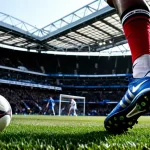The Foundations of UK Sports: Traditional Games and Their Origins
Traditional British sports history reveals a fascinating tapestry of ancient UK games deeply embedded in community life. Among the most prominent were mob football, stoolball, and shinty, games that predate many modern sports. Mob football was a chaotic, large-scale contest often involving entire villages, serving both as a competitive outlet and a social event. Stoolball, dating back to medieval times, combined elements of cricket and rounders, played primarily in the south of England, reflecting regional leisure preferences. Shinty, with roots in Scotland, resembled early forms of hockey and showcased the cultural distinctiveness within the UK.
These ancient UK games emerged as communal celebrations, often linked with festivals and seasonal events. This historical context highlights how sport was intertwined with cultural rituals and local identity, fostering early forms of competition and community engagement. Matches were not only contests but social gatherings binding participants, establishing local pride.
Understanding this traditional British sports history allows us to appreciate how these early games laid the groundwork for structured, contemporary sports. Their origins emphasize the UK’s long-standing relationship with sport as a vehicle for social cohesion, physical challenge, and cultural expression.
Tracing the Transition: Key Milestones from Folk Games to Regulated Sports
The evolution of UK sports from informal folk games to structured contests involved crucial steps of codification during the 18th and 19th centuries. This transformation formalised rules that were once fluid or local customs into standardised frameworks, enabling fair competition beyond villages.
For example, the creation of the Football Association (FA) in 1863 marked the first real effort to unify the diverse rules of football across England. By setting consistent regulations, the FA helped transition traditional British sports history from chaotic mob football matches into organised fixtures. Similarly, the Marylebone Cricket Club (MCC) formalised cricket’s rules in the 1780s, turning rural pastime into an internationally recognised sport.
The industrial revolution and rapid urbanisation played a pivotal role in this process. As populations concentrated in cities, there was increased demand for regular, predictable sporting competitions suited to urban life. This prompted governing bodies to design leagues and schedules that accommodated workers’ hours and fostered spectator culture.
Standardised rules also shaped early notions of fair play and sportsmanship, embedding values crucial to modern sports. These milestones laid the groundwork for contemporary UK sports governance, turning ancient UK games into widely practised national institutions.
Influences on Modern Competitions: Rules, Formats, and Structures
Understanding the modern sports rules UK relies heavily on recognising how ancient customs evolved into formal regulations. The sports governance systems today reflect a careful blend of tradition and innovation, ensuring competition remains fair and engaging. For example, many foundational rules in football and rugby trace directly back to earlier communal games, adapted through sports governance bodies like the Football Association (FA) and Rugby Football Union (RFU).
These governing bodies established competition standards, creating formats such as leagues and knockout tournaments to organise play efficiently. The transformation from irregular, community-based matches to scheduled fixtures introduced consistency, which boosted spectator interest and player professionalism.
Furthermore, traditional features — like the emphasis on sportsmanship and local pride seen in historical games — persist in modern competitions. These values are embedded within official conduct codes, demonstrating how modern sports rules UK are rooted in history. The evolution of competition formats also mirrors the integration of public demand, enabling larger audiences and broader participation.
In summary, the framework of today’s UK sports competitions is a sophisticated outcome of the fusion between sports governance, historical traditions, and technical rule development, preserving cultural heritage while adapting to contemporary needs.
Case Studies: From Village Pastimes to National Sports
The case studies UK sports offer vivid examples of how informal games evolved into structured national pastimes. Football’s origins trace back to mob football, a rough, community-driven contest with minimal regulation. Through codification by bodies like the Football Association, it transformed into the globally recognised sport it is today. This development highlights the shift from chaotic, local games into formal competition with precise modern sports rules UK.
Rugby’s legacy stems from schoolyard rivalries and regional variants, which gradually unified under the Rugby Football Union’s guidance. This process illustrates how diverse traditions coalesced, giving rugby its distinctive code and identity. Similarly, cricket evolved from a rural pastime to an internationally organised sport through the Marylebone Cricket Club’s early standardisation efforts, reflecting progressive rule codification and governance.
Each case study reveals themes common across the UK sports evolution:
- Local traditions anchored in community participation
- Gradual formalisation through codification
- Formation of governing bodies shaping modern competition formats
These narratives underscore that contemporary UK sports did not emerge overnight but are the product of lengthy cultural and organisational adaptation. Appreciating these origins deepens understanding of their enduring popularity and culturally embedded values.
Cultural Impact: Legacy of Traditional Games in Today’s UK Sporting Identity
The enduring influence of traditional British sports history is vividly seen in today’s UK sporting culture. Many heritage sports deeply embedded in local communities continue to thrive through festivals and seasonal events, preserving ancient customs. For instance, games like shinty and stoolball still feature prominently in regional celebrations, connecting present-day participants with their historical roots.
This continuity reinforces a sense of national identity built on shared values from early competition and community engagement. Traditional games shape how modern sports ceremonies and rituals observe respect, honour, and sportsmanship. These customs serve as cultural anchors amidst the expanding commercialisation of sports.
Such community traditions highlight sport’s role beyond mere competition — as a vehicle for social cohesion and cultural expression. They remind us that contemporary UK sports are part of a living heritage, not just global enterprises.
In sum, the legacy of ancient UK games sustains local pride and influences the character of modern sports. By upholding these traditions, the UK maintains a unique identity that balances innovation with respect for its rich sporting origins. This blend nourishes both grassroots participation and national enthusiasm, ensuring that heritage sports remain a vibrant thread in the tapestry of UK sporting culture.
Notable Events and Governing Bodies: Illustrating the Enduring Evolution
The history of governing bodies plays a pivotal role in shaping the sports events UK landscape from informal games to regulated contests. The formation of institutions like the Football Association (FA) in 1863 marked a landmark in governing bodies history, bringing together disparate football rules into a unified code. This unification enabled events such as the FA Cup—the world’s oldest national football competition—to flourish, showcasing the sport’s evolution from folk origins.
Another example is the Oxford-Cambridge Boat Race, a historic sports event UK begun in 1829, illustrating rowing’s rise as a formal sport through governing oversight. Such competitions reflect how early traditional contests transformed under official governance into prestigious fixtures.
Governing bodies history also includes continuous rule amendments aligning with evolving play styles and fairness, demonstrating adaptability. The Rugby Football Union (RFU), for instance, modified regulations throughout its history to balance tradition with modern demands.
These UK sports milestones highlight how standardised governance structures enabled systematic competition, promoting wider participation and spectator engagement. Understanding these milestones clarifies how sports events UK embody the ongoing dialogue between heritage and innovation, essential to British sports’ enduring success and global influence.


